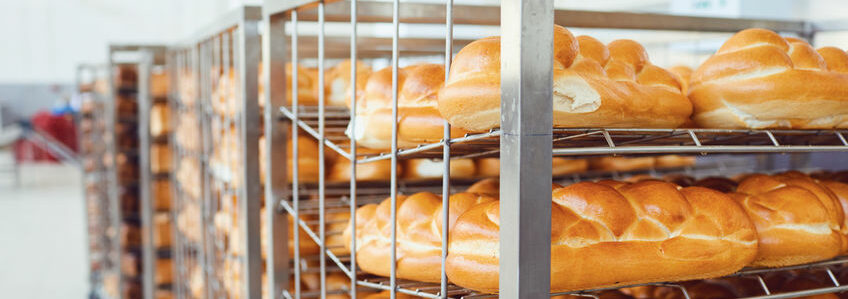How Objective Data Can Improve Your Bakery’s Quality Control

Quality control is a necessary step in the production process for bakeries around the globe. Today’s industrial baking demands precision, consistency, and efficiency to maximize yield and assure consistency. This makes quality tools like the Mixolab, which measures flour and dough quality with a scientific approach, necessary. This shift is crucial for both bakers and millers to meet modern challenges and maintain quality standards. Join us as we share insights from our recent “Bringing Objectivity into the Plant” BAKERview, sponsored by KPM Analytics.
A Brief History of Flour Quality Control
Since the advent of stone milling in 6,000 BC, flour production has come a long way. The invention of roller mills in 1879 allowed for more refined flour, and key innovations like the Kjeldahl method for protein determination (1883), the Falling Number test for starch activity (1950), and rheological tools like the Farinograph (1928) laid the foundation for flour quality control. These tools helped millers standardize flour based on protein, gluten content, and starch behavior. However, these traditional methods are now reaching their limits due to the increased complexity of both flour and baking processes.
Challenges Facing the Modern Baker
The baking industry nowadays is vastly different from its early 20th-century roots. While millers have long relied on laboratory tools to ensure flour consistency, bakers now face unprecedented challenges. Automation, the cleaning up of bread labels, and consumer demands for healthier and high-quality products have transformed the landscape. Bakers must manage numerous variables—ingredients, machinery, temperatures, and human factors—making it essential for them to have flour that is finely tuned to their specific processes.
Despite millers providing detailed Certificates of Analysis (COAs) based on parameters like protein content and Falling Number, a large number of bakers report ongoing issues with flour, even when it meets specifications. This discrepancy points to a need for more advanced tools that can account for the complex interactions between flour properties and baking outcomes.
Flour Quality: More Than Protein
Relying solely on protein content and a few additional metrics to judge flour quality is no longer sufficient. Bakers today require a multifactorial approach that takes into account the dough’s behavior during the entire baking process. This is where tools like the Mixolab come into play. The Mixolab can dynamically measure dough consistency during mixing, baking, and cooling, providing real-time data on protein denaturation, starch gelatinization, enzyme activity, and more.
How the Mixolab Advanced Flour and Dough Analysis
The Mixolab is one of the most significant innovations in flour quality control in the past 50 years. Unlike earlier tools, it measures the torque produced by a dough sample as it is mixed and heated, allowing bakers and millers to gain deep insights into dough behavior. The Mixolab provides data across five critical phases:
- Dough Development: Water absorption, mixing time, and stability.
- Protein Softening: How the protein network weakens during baking.
- Starch Gelatinization: Important for bread volume and crumb structure.
- Enzymatic Hydrolysis: Related to amylase activity and baking stability.
- Starch Retrogradation: Affects texture attributes over shelf life.
Profiling Flour for Specific Products
One of the Mixolab’s most powerful features is its ability to create customized profiles based on specific product requirements. By analyzing 20 or more flour samples that perform well in the production line, bakers can establish a “target profile” for their flour. This helps in screening out underperforming flours and communicating precise needs to millers. The profiler converts complex data into an easy-to-understand grading system, allowing for clearer communication and quality control.
From Bread to Crackers
Real-world examples highlight the importance of the Mixolab in maintaining product consistency. For instance, a bread manufacturer can use the Mixolab to develop a target profile for their flours, ensuring uniformity across production batches. Similarly, a cracker manufacturer can utilize the tool to understand how protease enzymes affect gluten quality during the baking process. These insights helped optimize formulations and reduce variability, ultimately improving product quality.
The Future of Flour Quality Control
As expertise gradually leaves the baking industry, relying on empirical knowledge is becoming less sustainable. Modern tools like the Mixolab offer a scientific approach to flour and dough analysis, reducing guesswork and improving communication between bakers and millers. By focusing on objective measurements and process-specific flour characteristics, bakers can achieve consistent, high-quality results, and millers can better meet their clients’ needs. This evolution fosters a stronger, more efficient baker-miller relationship, ensuring that both parties can meet the demands of today’s competitive market.
Curious to learn more? Watch the BAKERview here:
The Mixolab represents a paradigm shift in flour and dough analysis, offering a precise, multifactorial approach that benefits both bakers and millers. By adopting these modern tools, the industry can move beyond outdated metrics and achieve the consistency and quality demanded by today’s consumers. Explore more of KPM Analytics’ analytical solutions for better product quality here.
Want to stay up-to-date with BAKERpedia? Sign up for our newsletter today!

